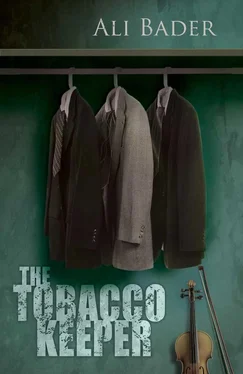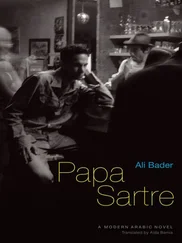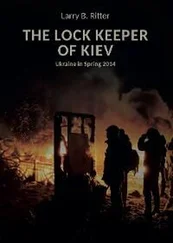The brown envelope
I stood before him in complete silence and looked intently at his face without uttering a word. I had no immediate response to what he told me concerning this personality whom I found quite puzzling.
Samir suddenly turned around and took a brown envelope off the shelf. He held it in both hands and looked at me, saying that a certain newspaper would be very happy to publish extracts in its Sunday supplement from what I would write about this man. At this point, Boris entered the room and stood near Samir’s desk without looking at me. He spoke to Samir about some agency matter. When he’d finished, he suddenly fell silent, then turned to me smiling. ‘You’re ready for this assignment, aren’t you?’ he said.
Boris’s confident statement represented the launch of the job, which I thought would be neither easy nor simple, contrary to what Samir had said. The differences between the two men seemed fairly clear, at least to me. The old Russian journalist had a great deal of training and expertise. In fact, he was the oldest foreign reporter I’d ever known. He’d visited almost all the countries of the Middle East and had been present at all the political crises, the years of tension, the civil wars and military coups. He’d written a number of books on Iraq, Iran, Palestine and Egypt. He was fluent in Arabic, Turkish and Persian. I learned that he had worked initially as a Middle East political analyst at Novosti News Agency in the former Soviet Union. After the collapse of the Soviet Union, he’d moved to the United States and become one of the most active experts on Iraqi affairs in particular and the Middle East in general.
My gut feeling proved correct, especially after Samir placed the envelope in my hands.
‘What’s this?’ I asked, totally bewildered.
The envelope was heavy and smelled of the past. It was held together with a yellow elastic band. I brushed it with the palm of my hand but there was no dust on it.
He told me that the envelope was vital for my work, because it contained all the letters that Kamal Medhat had sent to his wife Farida Reuben over many decades. Boris had acquired the letters from the wife herself. I was to unseal the envelope and use the contents for my piece about him.
I took the envelope and went with Faris into his office.
Faris opened the windows, revealing exactly the same wonderful view that I’d seen from Samir’s window. I sat at Faris’s desk which was overlaid with a film of dust. There were papers, newspapers, pictures, envelopes, an ink bottle, a laptop and several other objects. I put the envelope on the desk and opened it. I was stunned by what I saw.
Inside the envelope were numerous photographs and letters written by Kamal Medhat to his wife Farida. It was clear that Farida had sent them to Boris, who in turn had given them to Samir, who had then passed them on to me in the hope that they might throw some light on Kamal Medhat’s character.
Faris, who was sitting near me, looked in my direction without asking about the envelope, the letters or the photographs. He made no comment, significant or otherwise. It was clear that he knew all about the envelope and its story from the start. He probably knew of the correspondence between Farida and Boris Naumkin, but showed no interest in the subject.
I spread out the photographs, letters and official documents on the desk in front of me and flipped through them quickly without stopping to read. As soon as I’d read a date or a couple of lines, I pushed it aside and picked up another. The handwriting seemed to show real pain. I realized that I had to go patiently and systematically through the whole lot, line by line, word by word. But I was too impatient. I wanted to devour everything at once and absorb it all from the first glance.
I got up and, to relieve the tension, began to pace to and fro in the room, leaving the letters and photographs spread out on the desk.
While I was doing this, Boris came in and handed me the letter that Mrs Farida Reuben had sent to the Agency’s manager, to which she had attached more letters and photographs. I began to read it, totally oblivious to Faris, who was sitting at the table drinking tea.
A letter to the manager of the Press Cooperation Agency in Iraq
Mr Boris Naumkin
It was with great sorrow that I learned from one of your reports about the sad fate of the Iraqi musician Kamal Medhat. I wish to inform you that the dead man’s real name is Yousef Sami Saleh, who was my husband. We emigrated to Israel from Baghdad after the birth of our son Meir. But my husband could not bear living away from his country, Iraq. So he escaped to Iran, where he stayed on. He used to write to me frequently from there until he married a Shia Muslim woman, Tahira al-Tabtabaei, as you can see from the letters I’m sending you. He then entered Iraq under the name of Haidar Salman Ali. He obviously stayed in Iraq during this whole period, as is clear from his letters. Our correspondence never stopped. Because he could not send letters directly from Iraq to Israel, he would send them via musicians living in Moscow and Prague. He told me in detail about the conditions of his life in Iraq and how he was deported to Iran as an Iranian national in 1980. His wife Tahira died on the journey. In a letter dated August of that year, he told me that he had solved the problem by going to Syria and from there to Iraq. On a trip to Europe, he sent me a letter informing me that he was now living in Baghdad and was married to a woman called Nadia al-Amiry, who had given him a son, Omar. He told me the details of how he’d got to know her and married her. He also asked me about his son Meir. I had told him earlier that Meir, like him, could not stand living in Israel, that he had emigrated to the United States and had joined the US Navy.
Because he travelled so often to Europe, he was always assiduous in sending me letters and pictures, especially because he wanted to keep in touch with his son. I learned a great deal from his letters about his life, about his fame and his attitude to art, particularly during the Saddam Hussein era.
When I read the news in the papers about the murder of Kamal Medhat and when I compared the photograph and the message that Meir had sent me, I knew that it was Yousef that had been killed.
That, then, was how Yousef departed this life. Though hard to believe, I almost expected it to happen at any moment. I always feared he might be arrested and executed for espionage or some other charge.
What I really want to know is how he died, who was behind his murder and why he was killed in the first place. I also know that until this day he is lying in a hospital morgue, unburied. In the other documents, I’ve provided a lot of information that may help you to write the report about him. I believe this report will not only be useful to me. If that were the case, I wouldn’t bother to write to you or ask you to investigate. But I think it’s important for all those who loved him, or even those who hated him enough to murder him.
With my best wishes.
Professor Farida Reuben
Department of Arabic Studies
Jerusalem University
P.S. I have added footnotes to each letter to explain certain points or ideas. I also enclose some photographs, along with his diaries, and have added marginal notes on several other things not included in the letters. There were also political issues that I felt needed explanation: to give the full picture, I had to clarify what he had not mentioned in the letters. On a separate sheet I have listed the names of some people who I think may have additional information on him, information that I don’t personally have. I have also listed the addresses that I believe are important for tracing his life story.
Читать дальше












